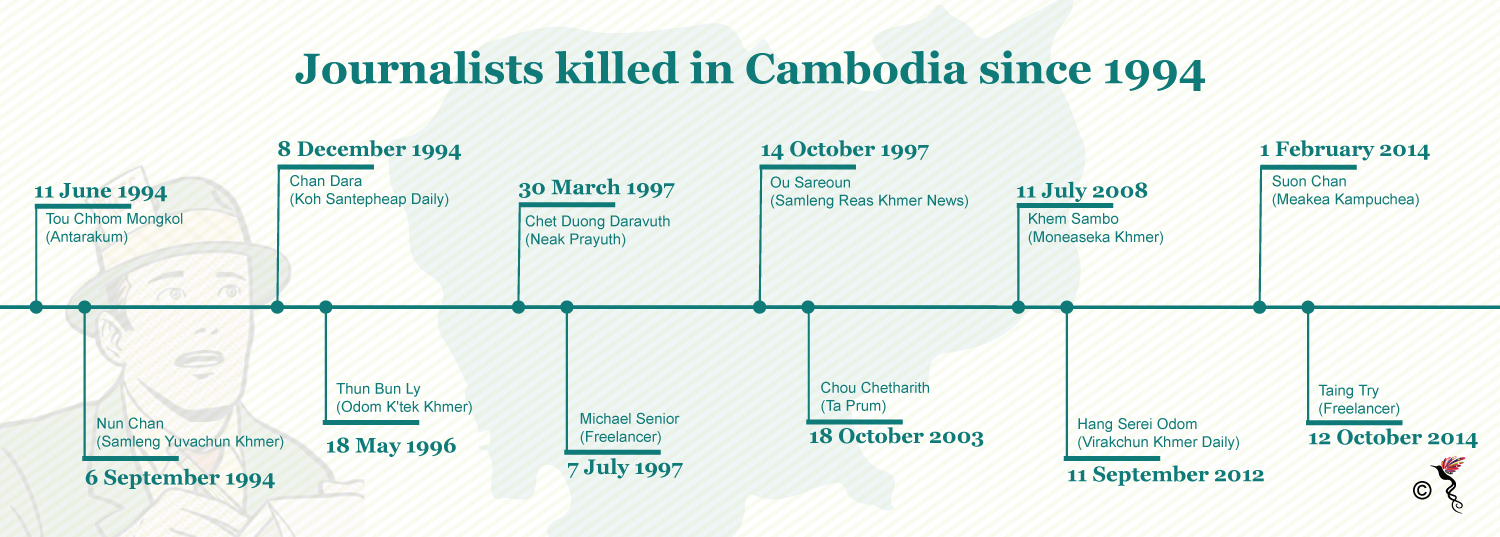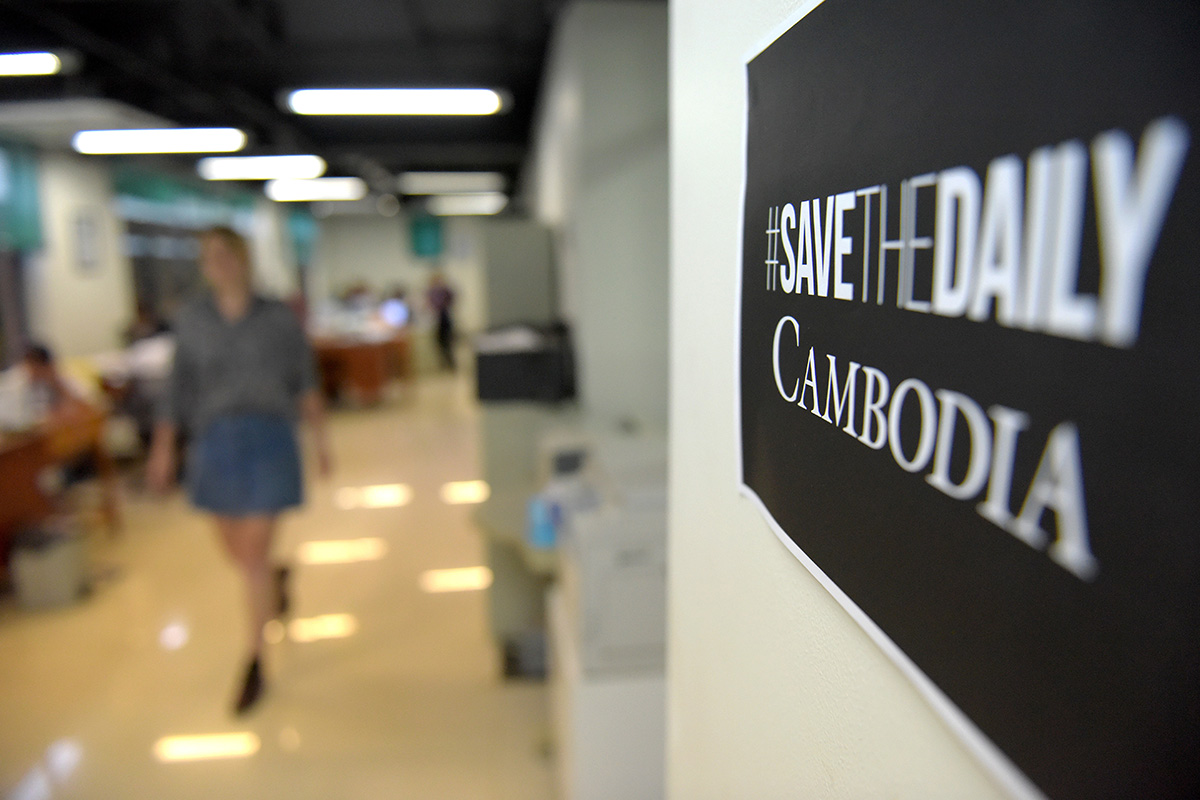"A @cambodiadaily friend says: I can't find a single paper in the city. Seller said, not only you who are looking for it but hundreds others," reads one of Jodie DeJonge's recent tweets on popular social media platform, Twitter. Following a recent crackdown on independent media by the Cambodian government, she will now be remembered as "the last editor" of The Cambodia Daily.
The Cambodia Daily was forced to cease its operations on September 4, 2017 after serving the Cambodian masses for 24 years. The daily was a special and singular part of Cambodia's free press, true to its motto of “All the News Without Fear or Favour.” In an article responding to this, DeJonge told AFP, "It's a dark day for press freedom in Cambodia."
Founded by Bernard Krisher in 1993, the widely respected newspaper served as an independent voice in a country with limited freedom of expression. Krisher is a US-born journalist with over 74 years of experience in the industry and has served in various prominent media organisations worldwide. He also founded the American Assistance for Cambodia in 1993, which is a non-profit organisation aimed at providing for the Cambodian people after the execution of two million Cambodians during the Khmer Rouge regime.
The announcement of the daily's closure came following the arrest of Kem Sokha, the head of the opposition CNRP (Cambodian National Rescue Party), who is accused of treason.
Tax dispute leads to closure
The Cambodia Daily has been ordered by the government to cease its operations over allegations that it has not paid 6.3 million dollars in taxes. In a statement to the media, the daily said it has been operating at a loss since 2008 and that the government’s figure is overstated. It says the tax department came up with the figures without reviewing their accounts or conducting an audit. The daily has not been allowed to appeal either.
Cambodia's Prime Minister Hun Sen labelled the newspaper as the country’s “chief thief” in a speech on August 22, 2017. He further mentioned that if the newspaper did not want to pay, it should “pack and go.” The daily via its statement refuted the allegations of theft, by claiming that its "unfounded and defamatory."
The daily newspaper publishes in both English and Khmer languages – often critical of Hun Sen's government – and has been in publication for the last 32 years. He is the longest-serving prime minister in Cambodian history.
The escalating press crackdown in Cambodia
According to the 2017 World Press Freedom Index, Cambodia is ranked 132nd out of 180 countries in press freedom, with a global scoring of 42.07. Cambodia has dropped four levels in the latest ranking, from 128th placing in 2016. However, the global score for the nation's press freedom has increased by 1.37 from 40.70 in 2016. The low global ranking and diminishing score shows that press freedom in Cambodia is becoming limited to an extended degree with each year passing. Media outlets in Cambodia are closely monitored and Hun Sen's government maintains a good rapport with owners of leading media organisations. Adding fuel to the fire, the Cambodian government has become more hostile towards independent media outlets, especially after the murder of a famous political commentator and activist Kem Ley in 2016. In the last decade, many journalists in Cambodia have been murdered for covering sensitive issues related to the local government's administration.

Timeline of journalists killed in Cambodia from 1994 to 2014, as compiled by the Committee to Protect Journalists.
Published annually since 2002 by the RSF (Reporters Without Borders), this index ranks 180 countries according to the level of freedom made available to the media and journalists in the respective countries. RSF is a non-governmental organisation specialising in the defence of media freedom in which the freedom "to inform and to be informed" is regarded as a basic human right. This correlates to the UN's (United Nations) Universal Declaration of Human Rights where “freedom of opinion and expression” indicates that everyone has the right to “seek, receive and impart information and ideas through any media and regardless of frontiers."
Other ASEAN (Association of Southeast Asia Nations) countries in the 2017 World Press Freedom Index were ranked as follows: Indonesia (124th), the Philippines (127th), Myanmar (131st), Thailand (142nd), Malaysia (144th), Singapore (151st), Brunei (156th), Lao (170th) and Vietnam (175th). This indicates that media outlets in ASEAN nations are generally controlled by their respective governments.
The Cambodian government has also closed down radio stations and ordered others not to broadcast independent news provided by the Voice of America and Radio Free Asia. The closure of the daily and other foreign-owned media outlets pointed to an escalating press crackdown in Cambodia.
According to AFP (Agence France-Presse), the US administration has expressed concern over Cambodia’s democracy after the government ordered the daily to leave the country and for pursuing a crackdown on independent media outlets like The Cambodia Daily – in efforts to silence any criticism towards the government in view of the upcoming Cambodian general election. Both the Australian and Chinese governments have expressed their full support against the press crackdown in Cambodia. In a statement by the Australian Embassy in Cambodia, the Australian government expressed their “concern over the recent happenings in Cambodia that threaten to narrow the political space, particularly the freedom for opposition parties, civil society and media organisations to play their part in Cambodia’s wider democracy.”
The "#SaveTheCambodiaDaily" and "#SavePressFreedomCambodia" hashtags are currently trending on Twitter – with netizens sharing heart-rending tweets in response to the daily's closure.
Sixty-four years have passed since Cambodia obtained its independence from the French. While the country is independent, it appears that Cambodians are living under a "dictatorship" as the freedom of expression is currently being challenged by recent actions of the Cambodian government.
Just a year short of celebrating its 25th anniversary, The Cambodia Daily will be sorely missed as the Cambodian government continues silencing its critics.
